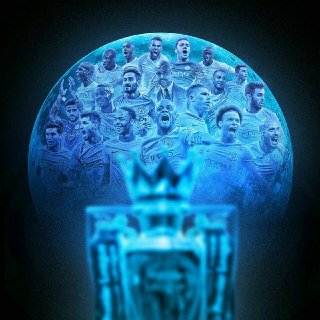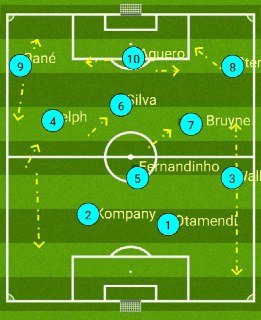Once In a Blue Moon: Pep´s Premier League
After a disappointing first season in which Pep Guardiola couldn’t quite transmit his ideas to his players, yesterday he finally accomplished one of the goals for which he was signed; a Premier League that will be remembered for the overwhelming superiority the “sky blues” showed throughout the entire competition. The 16 points lead with which Manchester City won their 5th league title show the extraordinary performance Guardiola got from his pupils in his second season at the helm.

It took some time for him to adapt to the English school of football, during his first year he once spoke of how difficult it was to pressure like his teams normally do, because of the English preference of playing long balls over slowly building up the play. This, along with the predominance of vertical over horizontal passes, forced the Spanish manager to learn how to control transitions if he wanted trade doubts for certainties.
To fight this, Pep had to adapt. He was surprised in his first season in England; it wasn’t enough with trying to control the game though possession and quick recoveries on the opposing part of the field. He had to start from the beginning, and so he did; he created his team from the back to the front, something obvious if one looks at his singings during the transfer period, of which stood out three side-backs and a goalkeeper.
The signing of Ederson was a way to adapt to the English model. Claudio Bravo, a fantastic goalkeeper and champion of everything with Barcelona, was overwhelmed by the very demanding area management the Premier demanded of him. With the Brazilian, Pep gained that superiority in the small area, without losing quality on the build-up.
Once he solved this, his next problem was the defense. He had to find a way to improve attack-defense transitions. On his first season, he attempted to “copy” the formula he used during his time in Germany; where he deployed Lahm and Alaba as false midfielders, creating numeric superiority on the midfield, and giving him more control over the tempos of the match. This time, he focused less on control, and accepted some realities of the English league. He signed Mendy, Walker and Danilo, he changed Fernandinho´s role, and gave Vincent Kompany more weight both on the creation on game as in it´s destruction. For the first time in his managerial career, Pep had to adjust his defense based on what the rival would do with the ball.
The signing of Kyle Walker is of special importance in understanding the planning of the season; unlike most side-backs Guardiola has had on his teams, the Englishman is rather limited on conductions with the ball at his feet, and not extremely creative on the final third. What he did have, was speed and explosiveness. He was fully capable of controlling those transitions that made so much damage during past season, and in attack, it became clear that the intention was to have two men on the sides to widen the attack though ruptures near the sidelines.
Fernandinho´s role as a holding midfielder has shifted more his focus towards defending the space left by the side-backs, and he has been given more defensive responsibilities to better stop rival counterattacks. During the first few games of the season, Mendy helped in these circumstances, but his long term injury limited the capacity of the team recover the ball on the left flank. Thus, Kompany had to step up to the task, the Belgium was the most capable player at the time of cutting the rival´s direct plays and long balls, and of guarding the back of Fabian Delph, who took Mendy´s place during most of the season.
On the attack, Manchester City´s evolution has been even more significant. The amazing performance of the team throughout the season can be explained trough the usage of asymmetrical flanks, Leroy Sané´s explosion as a top player, Raheem Sterling´s goalscoring capability during the first half of the season, and above all, Pep´s real masterpiece: the midfield duo of David Silva and Kevin De Bruyne.
Anyone can see that the Belgium has been the puppet master of the team, and the closest thing they have to a Messi, or Ronaldo; the individuality that stands out. It would take an entire article to better explain his contribution to the team (I have one in mind, in fact), but I will make a small resume. His evolution begins with being handed more weight on the initial steps of game creation, nowadays it´s not rare to see him at the same height on the field as Fernandinho, and act as a link between both halfs of the field. This way, he gives a clean start and a correct direction to the play, and due to his amazing sense of positioning and passing, as well as his virtuous physique, he arrives at the edge of the area with full lungs and a clear mind.
And while De Bruyne has gained more presence at the base of the play, Silva has gone the opposite direction, becoming more important playing as a classic #10. His range of action has become smaller, and more concentrated. This can be explained by the inclusion of Delph on the starting eleven; when the Citizens are attacking he abandons the left flank, leaving it all to Sané, and moves to the center-left, letting Silva take the center, and forming a sort of trident with De Bruyne at the center-right. From there, the Spaniard´s vision and pause give sense to City´s attack, and create clearer opportunities than last season, when this mechanism wasn´t implemented.

Escorting this over-populated midfield are the two wingers, with the clear mission to widen the field, keeping the rival side-backs away from the four Citizens at the center. They receive the ball and attract defenders, creating spaces on the middle of the pitch, and also have the possibility to break forward, dribbling defenders and with the support of the side-backs or even midfielders. Sané tends more to perform the former play, attracting more defenders with his great speed and dribbling skill and then crossing or passing the ball back to the edge of the box, while Sterling is more prone to attempt a breakthrough and shoot.
Inside the box, Aguero and Gabriel Jesus have shared the protagonism, the young Brazilian being more aggressive, and with more mobility and verticality, while the Argentinian has a better general vision, he performs better movements outside the box and is more combinative, and while as having better control of the ball in reduced spaces. One of the few cons to the season, however, is that while on paper they should work as a team, on practice their performances while sharing the attack have not been as good as expected, something to improve on next season to give more weight and alternatives to the attack; necessary during those Champion League nights.
Guardiola´s ability to transmit his ideas and his way of understanding football never ceases to amaze me; his way of making his players believe in a set philosophy. His pending task, however, is to show that same hierarchy and dominance on the European stage, something which I believe will come with the experience that his younger pupils will accumulate in the seasons to come. But on England, the team that he has created rules supreme, in a way only seen once in a blue moon.
***
Credits to @brfootball for the first image.
Congratulations @cruyffism14! You have completed some achievement on Steemit and have been rewarded with new badge(s) :
Click on any badge to view your own Board of Honor on SteemitBoard.
For more information about SteemitBoard, click here
If you no longer want to receive notifications, reply to this comment with the word
STOP